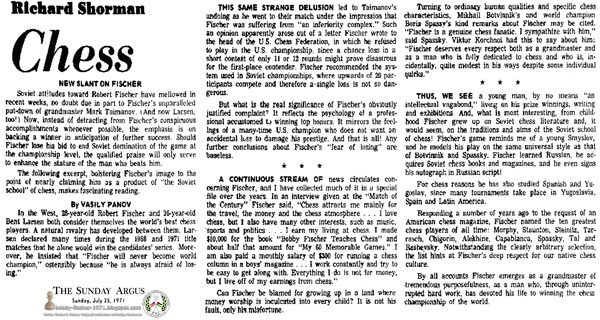The Argus Fremont, California Sunday, July 25, 1971 - Page 7
Chess: New Slant On Fischer by Richard Shorman
Soviet attitudes toward Robert Fischer have mellowed in recent weeks, no doubt due in part to Fischer's unparalleled put-down of grandmaster Mark Taimanov. (And now Larsen, too!) Now, instead of detracting from Fischer's conspicuous accomplishments whenever possible, the emphasis is on backing a winner in anticipation of further success. Should Fischer lose his bid to end Soviet domination of the game at the championship level, the qualified praise will only serve to enhance the stature of the man who beats him.
The following excerpt, bolstering Fischer's image to the point of nearly claiming him as a product of “the Soviet school” of chess, makes fascinating reading.
By Vasily Panov
In the West, 28-year-old Robert Fischer and 36-year-old Bent Larsen both consider themselves the world's best chess players. A natural rivalry has developed between them. Larsen declared many times during the 1968 and 1971 title matches that he alone would win the candidates' series. Moreover, he insisted that “Fischer will never become world champion,” ostensibly because “he is always afraid of losing.”
THIS SAME STRANGE DELUSION led to Taimanov's undoing as he went to their match under the impression that Fischer was suffering from “an inferiority complex.” Such an opinion apparently arose out of a letter Fischer wrote to the head of the U.S. championship, since a chance loss in a short contest of only 11 or 12 rounds might prove disastrous for the first-place contender. Fischer recommended the system used in Soviet championships, where upwards of 20 participants compete and therefore a single loss is not so dangerous.
But what is the real significance of Fischer's obviously justified complaint? It reflects the psychology of a professional accustomed to winning top honors. It mirrors the feelings of a many-time U.S. champion who does not want an accidental loss to damage his prestige. And that is all! Any further conclusions about Fischer's “fear of losing” are baseless.
A CONTINUOUS STREAM OF news circulates concerning Fischer, and I have collected much of it in a special file over the years. In an interview given at the “Match of the Century” Fischer said, “Chess attracted me mainly for the travel, the money and the chess atmosphere . . . I love chess, but I also have many other interests, such as music, sports and politics . . . I earn my living at chess. I made $10,000 for the book “Bobby Fischer Teaches Chess” and about half that amount for “My 60 Memorable Games.” I am also paid a monthly salary of $300 for running a chess column in a boys' magazine . . . I work constantly and try to be easy to get along with. Everything I do is not for money, but I live off of my earnings from chess.”
Can Fischer be blamed for growing up in a land where money worship is inculcated into every child? It is not his fault, only his misfortune.
Turning to ordinary human qualities and specific chess characteristics, Mikhail Botvinnik's and world champion Boris Spassky's kind remarks about Fischer may be cited. “Fischer is a genuine chess fanatic. I sympathize with him,” said Spassky. Viktor Korchnoi had this to say about him: “Fischer deserves every respect both as a grandmaster and as a man who is fully dedicated to chess and who is, incidentally, quite modest in his ways despite some individual quirks.
THUS, WE SEE a young man, by no means “an intellectual vagabond,” living on his prize winnings, writing and exhibitions. And, what is most interesting, from childhood Fischer grew up on Soviet chess literature and, it would seem, on the traditions and aims of the Soviet school of chess! Fischer's game reminds me of a young Smyslov, and he models his play on the same universal style as that of Botvinnik and Spassky. Fischer learned Russian, he acquires Soviet chess books and magazines, and he even signs his autograph in Russian script!
For chess reasons he has also studied Spanish and Yugoslav, since many tournaments take place in Yugoslavia, Spain and Latin America.
Responding a number of years ago to the request of an American chess magazine, Fischer named the ten greatest chess players of all time: Morphy, Staunton, Steinitz, Tarrasch, Chigorin, Alekhine, Capablanca, Spassky, Tal and Reshevsky. Notwithstanding the clearly arbitrary selection, the list hints at Fischer's deep respect for our native chess culture.
By all accounts Fischer emerges as a grandmaster of tremendous purposefulness, as a man who, through uninterrupted hard work, has devoted his life to winning the chess championship of the world.























